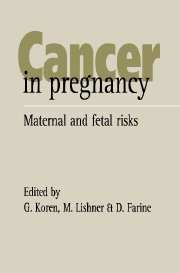Book contents
- Frontmatter
- Contents
- Preface
- List of contributors
- Part I Introduction
- Part II Specific tumors during pregnancy
- 8 Maternal and fetal outcome following breast cancer in pregnancy
- 9 Maternal and fetal outcome following Hodgkin's disease in pregnancy
- 10 Non-Hodgkin's lymphoma and pregnancy
- 11 Maternal and fetal outcome following invasive cervical cancer in pregnancy
- 12 Pregnancy and ovarian cancer
- 13 Malignant melanoma and pregnancy
- 14 Leukemia during pregnancy
- 15 Thyroid cancer and pregnancy
- Part III Fetal effects of cancer and its treatment
- Index
11 - Maternal and fetal outcome following invasive cervical cancer in pregnancy
from Part II - Specific tumors during pregnancy
Published online by Cambridge University Press: 06 July 2010
- Frontmatter
- Contents
- Preface
- List of contributors
- Part I Introduction
- Part II Specific tumors during pregnancy
- 8 Maternal and fetal outcome following breast cancer in pregnancy
- 9 Maternal and fetal outcome following Hodgkin's disease in pregnancy
- 10 Non-Hodgkin's lymphoma and pregnancy
- 11 Maternal and fetal outcome following invasive cervical cancer in pregnancy
- 12 Pregnancy and ovarian cancer
- 13 Malignant melanoma and pregnancy
- 14 Leukemia during pregnancy
- 15 Thyroid cancer and pregnancy
- Part III Fetal effects of cancer and its treatment
- Index
Summary
Introduction
Invasive carcinoma of the cervix is the most common gynecological malignancy associated with pregnancy because of its tendency to occur in the reproductive years. However, its occurrence is rare with an incidence of approximately 1 per 1240–2200 pregnancies. Although the relationship between carcinoma of the cervix and pregnancy has been extensively studied, review of the literature reveals that most studies were based on case reports, cohorts whose controls were not matched on prognostic factors, and cohorts without a control group.
Since it is unlikely that prospective studies will be conducted, due to the rarity of cervical cancer in pregnancy, we performed a matched historical cohort study to evaluate the influence of pregnancy on cervical cancer and cervical cancer on pregnancy, among women treated in the Princess Margaret Hospital in Toronto between 1958 and 1984. In addition, information regarding fetal outcome is provided.
Methods
All women with histologically confirmed invasive carcinoma of the cervix registered in the Princess Margaret Hospital from 1958 (when the hospital opened) to 1984 (when pregnancy was no longer in the data base) were identified.
To evaluate the effects of pregnancy on the course of the cervical cancer we matched women with the disease in pregnancy to nonpregnant women with carcinoma of the cervix.
- Type
- Chapter
- Information
- Cancer in PregnancyMaternal and Fetal Risks, pp. 120 - 130Publisher: Cambridge University PressPrint publication year: 1996
- 1
- Cited by

